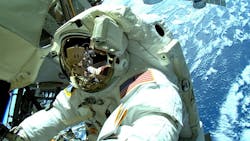NASA Names Astronauts for Boeing, SpaceX Flights
MIAMI -- Three men and one woman were named Thursday by NASA as the first four astronauts who will fly aboard spaceships built by private companies Boeing and SpaceX in the coming years.
Commercial space flights carrying astronauts to the International Space Station are set to begin in 2017, and will restore US access to space after a six-year hiatus following the retirement of the space shuttle program in 2011.
"These distinguished, veteran astronauts are blazing a new trail—a trail that will one day land them in the history books and Americans on the surface of Mars," said NASA Administrator Charles Bolden.
The most experienced astronaut of the quartet is Sunita Williams, 49.
Williams is a Navy captain and helicopter pilot who has already spent nearly a year (322 days) in space.
She holds the record for total cumulative spacewalk time by a female astronaut, at 50 hours and 40 minutes, NASA said.
Doug Hurley, 48, a retired Marine colonel, has piloted two Space Shuttle missions, including the final one, STS-135, in July 2011.
The others, Eric Boe, 50, and Robert Behnken, 44, are both Air Force colonels who have flown on two Space Shuttle missions each.
"We are excited to have such an experienced group of astronauts working with the Commercial Crew Program, Boeing and SpaceX and ultimately flying on the companies' flight test missions," said NASA Commercial Crew Program Manager Kathy Lueders.
Boeing is expected to be the first commercial company to carry a NASA astronaut to space aboard its CST-100 ship in late 2017.
SpaceX has not yet announced a target date for its first crewed flight of the Dragon spaceship.
The California-based company headed by Internet entrepreneur Elon Musk suffered a major setback last month when its Falcon 9 rocket exploded shortly after launch, destroying the Dragon cargo ship it was carrying toward the International Space Station.
A cause has not yet been determined for the blast, which was the third accident in eight months involving cargo headed to space.
Orbital's Antares rocket exploded after takeoff in October, and Russia lost track of a Progress supply ship in April.
NASA has funneled $4.2 billion to Boeing and $2.6 billion to SpaceX to help the companies build a successor to the space shuttle and to encourage competition in the aerospace industry.
In the meantime, the world's astronauts fly to the ISS aboard Russian Soyuz spaceships at a cost of $70 million per seat.
Copyright Agence France-Presse, 2015
About the Author
Agence France-Presse
Copyright Agence France-Presse, 2002-2025. AFP text, photos, graphics and logos shall not be reproduced, published, broadcast, rewritten for broadcast or publication or redistributed directly or indirectly in any medium. AFP shall not be held liable for any delays, inaccuracies, errors or omissions in any AFP content, or for any actions taken in consequence.
